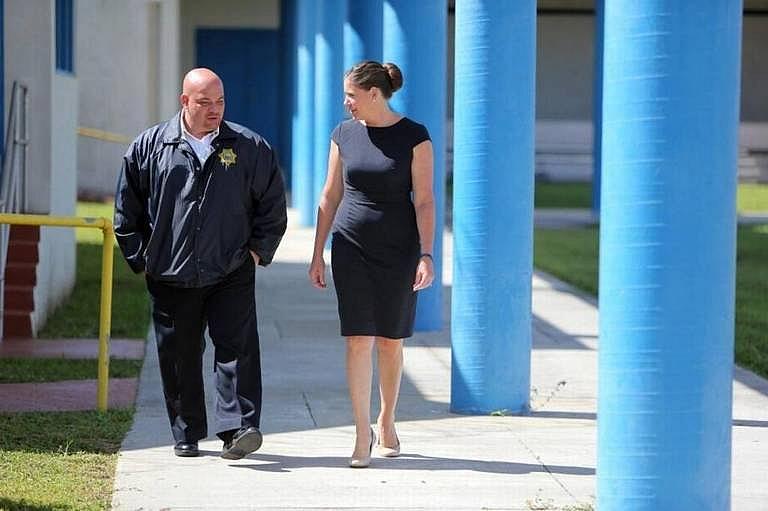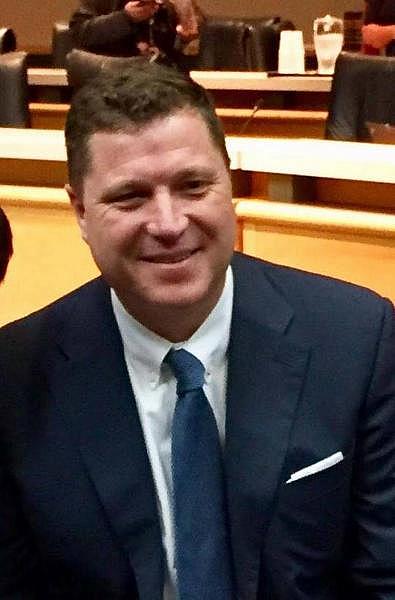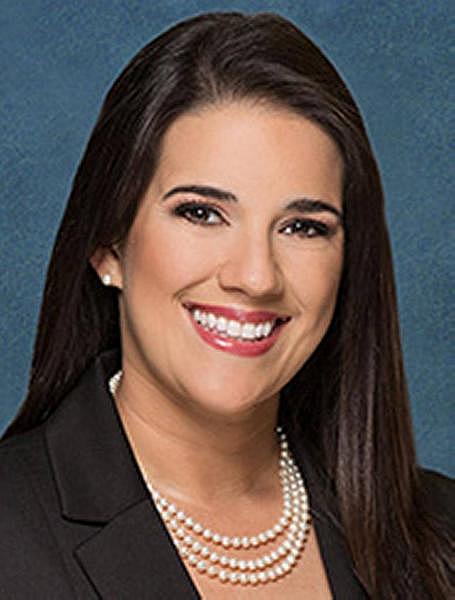Senators demand more state oversight of private juvenile facilities
This article and others in this series were produced as part of a project for the University of Southern California Center for Health Journalism’s National Fellowship, in conjunction with the USC Annenberg School for Communication and Journalism.
Other stories in the series include:
Powerful lawmaker calls for juvenile justice review in wake of Herald series
Juvenile justice chief defends agency, calling abuses ‘isolated events’
An officer used a broom to beat juveniles into submission. They called it ‘Broomie.’
NAACP demands reform as lawmakers plan tour of lockup where youth was fatally beaten
Criminal record? Horrible work history? Florida juvenile justice would still hire you
At this juvenile justice program, staffers set up fights — and then bet on them
Dark secrets of Florida juvenile justice: ‘honey-bun hits,’ illicit sex, cover-ups
Lightning blasted his shoes off — and illuminated a pattern of abuse by staff
How small rebellions by Florida delinquents snowball into bigger beatings by staff
FIGHTCLUB: A Miami Herald investigation into Florida’s juvenile justice system

Christina K. Daly, secretary of the Florida Department of Juvenile Justice, tours the Miami-Dade juvenile lockup. Emily Michot
TALLAHASSEE—Members of a state Senate committee that oversees the Department of Juvenile Justice Wednesday dismissed assertions that the abuse of children in state custody is the work of a few “bad apples” — and vowed to start hunting for concrete solutions.
The abuses were recently documented in a Miami Herald investigative series, Fight Club.
Sen. Jeff Brandes, a St. Petersburg Republican who chairs the Senate Appropriations Subcommittee on Criminal Justice, and other members of the panel said they want to see more oversight of the private companies that operate 53 residential facilities for juvenile delinquents under contract with DJJ. They also are seeking better monitoring and more openness when abuses occur.
Sen. Jeff Brandes. Kristen M. Clark
“Our discussion is going to focus on transparency and making sure we have very effective reporting,” Brandes told the Herald/Times after the meeting. “And I want live video cameras in these facilities that are monitored by the department.”
For the second time since the Herald published its six-part series, Brandes’ committee asked DJJ Secretary Christina K. Daly to appear before it to answer questions.
The Herald detailed the widespread use of unnecessary and excessive force; officers and youth workers who outsource disciplineby designating youths as enforcers; sexual misconduct by staff, some of which goes unreported; and a propensity of employees to neglect the medical needs of teens, sometimes calling them fakers.
The hearing came as the Florida chapter of the NAACP called on the U.S. Justice Department to open an investigation into abuses highlighted in the series. The request came in a letter from Adora Obi Nweze, president of the NAACP's Florida conference.
“The state of Florida has failed these children for too long,” said Derrick Johnson, president and CEO of the national organization. “DOJ must begin a thorough and transparent review of these atrocious practices, and a complete reform of the failing system. We are asking the Justice Department to take steps immediately.”
Much of the discussion in Wednesday’s hearing centered on lawmakers’ concerns that privately run residential facilities lack accountability. One lawmaker, Sen. Jeff Clemens, a Lake Worth Democrat, advocated scrapping the privatization of youth corrections programs altogether. Others suggested reforms that might make the providers more answerable to lawmakers and juvenile justice administrators.
Daly acknowledged that the state has more control over the 3,300 employees who work for DJJ, many of them operating regional lockups, than it does over the thousands who work for the private companies, many of them operating their programs for profit.
“The performance evaluation of individual private employees is something they’re responsible for,” Daly told the committee. “We don’t get into that level of performance evaluation process.”
But that lack of oversight led to numerous reports in which a private residential program was given satisfactory ratings on its annual comprehensive evaluation — even as staff was caught abusing youths under its care.
“One of the things that is concerning is that in some places these incidents occurred, but their ratings are not reflective of the horrible incidents that occurred there,” said Sen. Anitere Flores, R-Miami.
Sen. Anitere Flores. Florida Senate website
“We agree this is a problem. We agree that really bad things are happening. We agree this is unacceptable,” Flores added. “What are the things this Legislature needs to do — because, ultimately, it is our responsibility — what do we need to do to make sure these things don’t happen?”
Clemens asked: “When we’re dealing with the safety of kids, don’t you think it would be better for the state to control the evaluation of those employees, rather than a private company whose main concern is profit?”
Daly didn’t answer but did remind the committee that the decision to privatize juvenile justice programs was a decision made by the governor and Legislature more than a decade ago.
“We carry out the policy and direction the Legislature sets for us,” Daly said.
Daly staunchly defended her agency, dismissing many of the Herald’s findings as the actions of a small number of “bad apples” who were quickly held to account for their misconduct.
Some committee members were skeptical.
“I’m frustrated with hearing the narrative that it’s only about bad apples,” said Sen. José Javier Rodriguez, a Miami Democrat. “I want to look at how systems can be improved. Are there ways to protect the kids in custody better? The starting point is that systemic problems have to be dealt with to make sure that kids are safe in our custody.”
Sen. José Javier Rodriguez. Florida Senate website
Daly began her remarks Wednesday as she had done previously, saying there was nothing fundamentally wrong with her agency’s performance, or that of the private providers. She added: “Any time an incident happens the system responds appropriately and holds each and every person accountable.”
“I am not here standing in front of you to deny or diminish what happened in the system for the past more than a decade,” she said before fielding questions.
“Individuals have made horrible decisions,” she said, adding that “the environment can be very challenging.”
She said — as she did at previous public hearings — that none of the incidents the Herald reported were new to the agency and that each had been addressed.
“The majority of the all of the incidents that were reported in the Herald, to be honest, have been reported in the media over the years,’’ she said.
After the meeting, Daly’s chief of staff clarified that the incidents were reported “through DJJ’s Central Communications Center,” after which the DJJ Inspector General’s Office determined whether to review the incident or investigate it.
Daly also told the committee it was a bad idea to squeeze the leash too tightly on the contractors. And she said she wasn’t sure that the companies’ contracts would even allow it — even though DJJ writes the contracts.
“We have to be cautious and careful of getting too much into the weeds of their business to that level,” she said.
Clemens responded: “I think we should get rid of the private companies and do this ourselves. I think that’s the only way we can have true accountability.”
Brandes, who is an advocate of sentencing reforms, said he wants to see:
▪ School resource officers in all residential detention facilities for youth offenders who could serve as an “independent party to provide third-party oversight.”
▪ Live camera feeds from each program that could be monitored constantly by DJJ.
▪ A 10 percent pay increase for state employees working for DJJ, as recommended by Gov. Rick Scott and Daly a little over a week before the series was published. It is the first pay increase the agency has requested in 10 years and it will apply only to officers working for the state, not those working for the private companies.
Brandes said it is “concerning” that the agency sought the pay increase only after the Herald started compiling the data and disclosing the low pay of detention officers.
The starting salary for a recruit hired by the state is $12.25 an hour, or $25,479 a year. Private contractors that run programs where detained teens serve their sentences often pay less than that. TrueCore Behavioral Solutions, the largest provider, offers new hires $19,760 a year.
“What we’re seeing at the Department of Juvenile Justice, and the Department of Corrections, is that resources are a significant issue,” he told the Herald/Times. “These issues don’t come up overnight and there has been a need to raise salaries with juveniles for a long time.”
[This story was originally published by the Miami Herald.]

